Dalia Grybauskaitė
Dalia Grybauskaitė (Lithuanian pronunciation: [dɐˈlʲɛ ɡʲrʲiːbɐʊsˈkɐ̂ˑɪtʲeː]; born 1 March 1956) is a Lithuanian politician who served as the eighth President of Lithuania from 2009 until 2019. She is the first woman to hold the position and became in 2014 the first President of Lithuania to be reelected for a second consecutive term.[2][3]
Dalia Grybauskaitė | |
|---|---|
.jpg) | |
| 8th President of Lithuania | |
| In office 12 July 2009 – 12 July 2019 | |
| Prime Minister | Andrius Kubilius Algirdas Butkevičius Saulius Skvernelis |
| Preceded by | Valdas Adamkus |
| Succeeded by | Gitanas Nausėda |
| European Commissioner for Financial Programming and the Budget | |
| In office 22 November 2004 – 1 July 2009 | |
| President | José Manuel Barroso |
| Preceded by | Michaele Schreyer Markos Kyprianou (Budget) |
| Succeeded by | Algirdas Šemeta |
| European Commissioner for Education and Culture | |
| In office 1 May 2004 – 11 November 2004 Served with Viviane Reding | |
| President | Romano Prodi |
| Preceded by | Viviane Reding |
| Succeeded by | Ján Figeľ (Education, Training, Culture and Multilingualism) |
| Personal details | |
| Born | 1 March 1956 Vilnius, Lithuanian SSR, Soviet Union |
| Political party | Communist Party of the Soviet Union (1983–1989) Communist Party of Lithuania (1989–1990) Independent (1990–present) |
| Education | Saint Petersburg State University |
| Net worth | US$0.7 million[1] |
| Signature | |
Grybauskaitė has served as Minister of Finance, as well as European Commissioner for Financial Programming and the Budget from 2004 to 2009. She is often referred to as the "Iron Lady"[4][5] or the "Steel Magnolia".[6]
Early years
Grybauskaitė was born on 1 March 1956 to a working-class family in Vilnius. Her mother, Vitalija Korsakaitė (1922–1989), was born in the Biržai region and worked as a saleswoman. Her father, Polikarpas Grybauskas (1928–2008), was an electrician and driver. He also was a NKVD serviceman during the Second World War. In honor of the 40th anniversary of Victory Day, he was awarded the Order of the Patriotic War, II degree.[7] Grybauskaitė attended Salomėja Nėris High School. She has two brothers, one living in Lithuania, and the other living in Colorado Springs, in the United States. She has described herself as not among the best students, receiving mostly fours in a system where five was the highest grade. Her favourite subjects were history, geography and physics.[8]
Grybauskaitė began participating in sports at the age of eleven, and became a passionate basketball player.[8] At the age of nineteen, she worked for a year at the Lithuanian National Philharmonic Society as a staff inspector. She then enrolled in Saint Petersburg State University, then known as Leningrad A.A. Zhdanov State University, as a student of political economy.[9] At the same time, she began working in a local factory in Saint Petersburg. In 1983, Grybauskaitė graduated with a citation and returned to Vilnius, taking a secretarial position at the Academy of Sciences. Work in the Academy was scarce and so she moved to the Vilnius Communist Party High School, where she lectured in political economics and global finance.[9] From 1983 to December 1989, she was a member of the Communist Party of the Soviet Union and after the Communist Party of Lithuania broke away from the CPSU in December 1989, she was member of the CPL until June 1990. In 1988, she defended her PhD thesis at Moscow (Academy of Social Sciences).
In 1990, soon after Lithuania reestablished its independence from the Soviet Union, Grybauskaitė continued her studies at the Edmund A. Walsh School of Foreign Service at Georgetown University, Washington D.C., in the Special Programme for senior executives.[10]
Early career
Between 1991 and 1993, Grybauskaitė worked as Director of the European Department at the Ministry of International Economic Relations of the Republic of Lithuania. During 1993, she was employed in the Foreign Ministry as director of the Economic Relations Department, and represented Lithuania when it entered the European Union free trade agreements. She also chaired the Aid Coordination Committee (Phare and the G24). Soon afterwards, she was named Extraordinary Envoy and Plenipotentiary Minister at the Lithuanian Mission to the EU.[10] There, she worked as the deputy chief negotiator for the EU Europe Agreement and as a representative of the National Aid Co-ordination in Brussels.
In 1996, Grybauskaitė was appointed Plenipotentiary Minister in the United States' Lithuanian embassy. She held this position until 1999, when she was appointed deputy Minister of Finance. As part of this role, she led Lithuanian negotiations with the World Bank and International Monetary Fund. In 2000, Grybauskaitė became Vice Minister of Foreign Affairs, going on in 2001 to become Minister of Finance in the Algirdas Brazauskas government.[11] Lithuania joined the European Union on 1 May 2004, and Grybauskaitė was named a European Commissioner on the same day.[9]
European Commission
Grybauskaitė initially served as European Commissioner for Education, Culture, Multilingualism and Youth. She held this position until 11 November 2004, when she was named European Commissioner for Financial Programming and the Budget within the José Manuel Barroso-led Commission.
In November 2005, Grybauskaitė was named "Commissioner of the Year" in the European Voice Europeans of the Year poll. She was nominated "for her unrelenting efforts to shift EU spending towards areas that would enhance competitiveness such as research and development." She commented:[12]
I don't usually participate in contests, so this is a very pleasant surprise for me. I consider it a distinction not for me personally, but for all the new EU Member States, both small and large, as an acknowledgment of their bringing a new and fresh perspective to the EU. I think that it's also a prize for having the courage to speak the often difficult truth and to point out the real price of political rhetoric in Europe. As for results, we still have to wait for them. An agreement on the budget for 2007–2013, which Europe really needs, is most important.
As Financial and Budget Commissioner, she strongly criticized the EU budget, stating it was "...not a budget for the 21st century."[13] The majority of the EU budget was spent on agricultural programmes. Grybauskaitė presented a 2008 EU budget in which, for the first time in its history, spending on growth and employment constituted the highest share of the budget, exceeding that of agriculture and natural resources.[14] She frequently criticised the Lithuanian Government, headed by Prime Minister Gediminas Kirkilas, for its lack of response to the approaching financial crisis.[15]
2009 presidential election
On 26 February 2009, Grybauskaitė officially announced her candidacy for the 2009 presidential election. In her declaration speech, she said:
I decided to return to Lithuania if the Lithuanian people decide I am needed there now. I think that we all long for the truth, transparency and responsibility for our country. We all want to live without fear, with confidence in ourselves, in each other, and in tomorrow. I can and I want to contribute with my experience, knowledge and skills to expel shadows from morality, politics, and economics to create a citizen-ruled Lithuania – a state of citizens. Therefore, I will run for the Lithuanian presidency.[16]
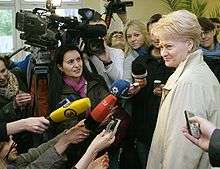
There were three women and four men as presidential candidates. Opinion polls taken in February 2009 showed that Grybauskaitė was the undisputed leader in the race.[17] She ran as an independent, although she was supported by the dominant Conservative Party as well as by NGOs, including Sąjūdis.[18][19]
Her campaign was primarily focused on domestic issues. After years of strong economic growth, Lithuania faced a deep recession, with double-digit declines in economic indicators. The unemployment rate rose to 15.5% in March 2009, and a January street protest against the government's response to the recession turned violent.[20] During the campaign, Grybauskaitė stressed the need to combat the financial troubles by protecting those with the lowest incomes, simplifying the Lithuanian bureaucratic apparatus, and reviewing the government's investment programme.[21] She also promised a more balanced approach in conducting foreign policy, the primary constitutional role of the Lithuanian presidency.
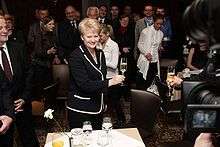
The election was held on 17 May 2009. Grybauskaitė won in a landslide, receiving 69.1% of the valid vote.[22] The 51.6% turnout was just above the threshold needed to avoid a runoff election.[23] In winning the election, Grybauskaitė became not only the first female president of Lithuania, but won by the largest margin recorded for a free election in Lithuania.[24]
Political analysts attributed the easy victory to Grybauskaitė's financial competence and her ability to avoid domestic scandals.[23] The international press was quick to dub her the "Lithuanian Iron Lady" for her outspoken speech and her black belt in karate.[25][26] Grybauskaitė, who speaks Lithuanian, English, Russian, French and Polish,[25] has mentioned Margaret Thatcher and Mahatma Gandhi as her political role models.[27]
Presidency (2009–2019)
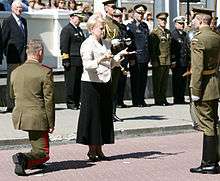
.jpg)
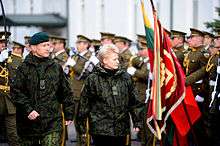
Grybauskaitė assumed presidential duties on 12 July 2009, and accepted half of her presidential salary (312,000 litas).[20] Her first presidential visits abroad were made to Sweden and Latvia;[28] in April 2011, she made a state visit to Norway.[29] Grybauskaitė supported the NATO-led military intervention in Libya.[30]
On 19 December 2013, Grybauskaitė decided to boycott the Sochi Winter Olympics together with other Western leaders, including German president Joachim Gauck, French president François Hollande, and the US president Barack Obama, due to Russia's human rights violations, attitudes and behaviour with Eastern partners and Lithuania.[31]
In 2014, Grybauskaitė was reelected President. She received 46% of the vote in the first round, and defeated Zigmantas Balčytis of the Social Democratic Party in the run-off with 58% of the vote.
Foreign policy
Relations with Russia
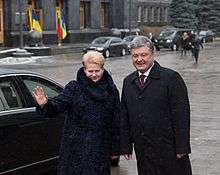

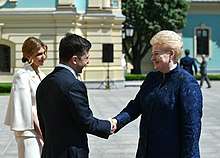
Grybauskaitė called the dependence on Russian gas an "existential threat" to Lithuania.[32]
Following her reelection in May 2014, she said "Dignity, self-respect and mutual benefit, these are the principles that should set the basis for relations between countries and no doubt, knowing that this is our neighbor, we wish this country to democratize and cope with the arising economic challenges".[33]
In June 2014, Grybauskaitė told the German news magazine Focus: "[Putin] uses nationality as a pretext to conquer territory with military means. That's exactly what Stalin and Hitler did." She also claimed that Russia and Putin were "characterised by aggressiveness, violence, and a willingness to overstep boundaries."[34]
On 20 November 2014, Grybauskaitė, commenting on the conflict in Ukraine, characterized Russia as "a terrorist state which carries out an open aggression against its neighbors".[35]
In June 2018, Grybauskaitė said that Lithuania should be ready for Russian invasion. She also said that Western states will "wake up" only "when they have been attacked" by Russia.[36]
In December 2018, Grybauskaitė told Ukrainian President Petro Poroshenko that Lithuania would increase military assistance to Ukraine: "We will additionally supply more ammunition, send more military instructors and cyber security experts to help repel hybrid attacks, especially during the elections."[37]
Relations with the EU and United States
In December 2014, Grybauskaitė said that Lithuania will have to take the responsibility for the secret CIA-operated prison in Lithuania.[38]
Regarding British Prime Minister Theresa May's comments on acting as a "bridge" between the European Union and the United States, Grybauskaitė said that "I don't think there is a necessity for a bridge. We communicate with the Americans on Twitter."[39][40] In March 2017, Grybauskaitė criticized the government of Poland and Prime Minister Beata Szydło for not endorsing Donald Tusk again for the President of the European Council.[41]
Brexit
In January 2019 Grybauskaitė said a "no-deal Brexit" would be better than delaying Brexit. She said the EU would negotiate mini or sectoral arrangements to mitigate a no-deal scenario.[42]
Personal life
Grybauskaitė is unmarried and has no children. In addition to her native Lithuanian, she is fluent in English, Russian and Polish, and also speaks French.[43] Grybauskaitė has a black belt in karate.[44]
Awards
Grybauskaitė has received the following national and international awards:
| Year | Award | Issuer |
|---|---|---|
| 2003 | The Commander's Cross of the Order of the Lithuanian Grand Duke Gediminas | Lithuania |
| 2009 | The Order of Vytautas the Great with the Golden Chain[45] | Lithuania |
| 2011 | Commander Grand Cross with Chain of the Order of the Three Stars[46] | Latvia |
| 2011 | Knight Grand Cross of the Royal Norwegian Order of St. Olav[47][48] | Norway |
| 2011 | Knight Grand Cross of the Order of the Falcon[49] | Iceland |
| 2012 | Member of Xirka Ġieħ ir-Repubblika | Malta |
| 2012 | Grand Officer of the Order of Saint-Charles[50][51] | Monaco |
| 2013 | Knight Grand Cross with Collar of the Order of the White Rose of Finland[52] | Finland |
| 2013 | Knight Grand Cross with Collar of the Order of the Cross of Terra Mariana[52] | Estonia |
| 2013 | Gran Cross Special Class of the Order of Merit of the Federal Republic of Germany | Germany |
| 2013 | Charlemagne Prize for 2013[53] | Aachen |
| 2015 | Order of the Republic[54] | Moldova |
| 2015 | Collar of the Order pro merito Melitensi | SMOM |
| 2015 | Knight of the Order of the Seraphim[55] | Sweden |
| 2016 | Order for Exceptional Merits[56] | Slovenia |
| 2016 | Collar of the Order of the Star of Romania | Romania |
| 2018 | Knight Grand Cross of the Order of the Netherlands Lion[57] | Netherlands |
| 2018 | Knight Grand Cross of the Order of Merit of the Italian Republic with Collar[58] | Italy |
| 2018 | Member of the Order of Liberty[59] | Ukraine |
| 2019 | Knight of the Order of the White Eagle[60] | Poland |
References
- "D.Grybauskaitės turtas per metus sumenko beveik 300 tūkst. eurų, turtingesnis netapo ir S.Skvernelis".
- "Lithuania's first female president sworn in for second term". EuroNews. 12 July 2014.
- Skard, Torild (2014) "Kazimiera Prunskiene and Dalia Grybauskaite" in Women of power – half a century of female presidents and prime ministers worldwide, Bristol: Policy Press, ISBN 978-1-44731-578-0, pp. 335–40.
- Martyn-Hemphill, Richard (21 May 2015). "The Baltic 'Iron Lady': Putin's solitary foe". The Politico. Retrieved 23 July 2015.
- Peleschuk, Dan (20 November 2017). "Meet the Iron Lady of Lithuania". The Politico. Retrieved 13 December 2017.
- "Lithuania's new president Steel magnolia". The Economist. 29 May 2009. Retrieved 1 June 2009.
- "ГРИБАУСКАС – GRIBAUSKAS :: Персональный список". baza.vgdru.com. Retrieved 14 August 2020.
- Jablonskaitė, Dovilė (7 March 2009). "Mąslių akių mergaitė" (in Lithuanian). Klaipėda diena. Retrieved 18 May 2009.
- Grybauskaitė, Dalia. "Apie Mane" (in Lithuanian). Archived from the original on 20 April 2009. Retrieved 20 May 2009.
- "Curriculum Vitae of Dr. Dalia Grybauskaitė". European Commission. Retrieved 18 May 2009.
- "After Restoration of Independence". finmin.lrv.lt.
- "Dalia Grybauskaitė News 2005". European Commission. 29 November 2005. Retrieved 20 May 2009.
- "Grybauskaite: "Today's budget is not a budget for the 21st century"". 1 August 2005. Retrieved 18 May 2009.
- "The 2008 EC Budget" (PDF). European Union Committee. Retrieved 19 May 2009.
- "D.Grybauskaitė: kritika Lietuvai – oficiali EK nuomonė". Delfi.lt. 25 June 2008. Retrieved 19 May 2009.
- "D. Grybauskaitė sieks prezidento posto" (in Lithuanian). Lithuanian National Radio and Television. 26 February 2009. Retrieved 20 May 2009.
Aš apsisprendžiau, kad sutinku grįžti į ietuvą, jei Lietuvos žmonės nuspręs, kad esu reikalinga dabar Lietuvoje. Manau, kad visi esame pasiilgę tiesos, skaidrumo ir atsakomybės už savo šalį. Norime visi gyventi be baimės, pasitikėdami savimi, vienas kitu ir rytojumi. Galiu ir noriu skirti savo patirtį, žinias bei gebėjimus tam, kad išguitume šešėlius iš moralės, politikos, ekonomikos ir sukurtume tokią piliečių Lietuvą, piliečių valstybę. Todėl dalyvausiu Lietuvos prezidento rinkimuose.
- "Po D.Grybauskaitės apsisprendimo politologai nemato jai konkurencijos" (in Lithuanian). Lietuvos rytas. 26 February 2009. Archived from the original on 1 March 2009. Retrieved 20 May 2009.
- "Lithuanians vote in female president". Deutsche Welle. 18 May 2009. Retrieved 20 May 2009.
- "Lietuvos Sąjūdis nusprendė paremti D.Grybauskaitę" (in Lithuanian). Klaipėda diena. 14 May 2009. Retrieved 20 May 2009.
- "Lithuania president-elect vows to fight recession". Associated Press , reprinted by CBC News. 18 May 2009. Retrieved 20 May 2009.
- "Grybauskaitė: reikia taupyti biurokratų, o ne paprastų žmonių sąskaita" (in Lithuanian). Alfa.lt. 29 January 2009. Retrieved 20 May 2009.
- "Central Electoral Committee of the Republic of Lithuania, European Election Database". vrk.lt.
- "Lithuania gets first woman leader". BBC News. 18 May 2009. Retrieved 19 May 2009.
- "Šampanas iššautas: D.Grybauskaitė be didesnės konkurencijos išrinkta Lietuvos prezidente" (in Lithuanian). Lietuvos rytas. 20 May 2009. Archived from the original on 21 May 2009. Retrieved 20 May 2009.
- "Dalia Grybauskaite: Lithuania's 'Iron Lady'". Khaleej Times Online. Archived from the original on 8 June 2011. Retrieved 19 May 2009.
- "D. Grybauskaitę vadina Lietuvos "geležine ledi"". Lithuanian National Radio and Television. Archived from the original on 25 May 2012. Retrieved 19 May 2009.
- "Lithuania elects first female president". ABC News (Australia). 18 May 2009. Retrieved 20 May 2009.
- Premjeras prezidentės pirmojo vizito į Švediją nelaiko posūkiu užsienio politikoje. Retrieved on 7 October 2009
- "Det Norske Kongehus". kongehuset.no.
- "Libya: Where do Nato countries stand?". BBC News. 21 April 2011.
- Prezidentė Dalia Grybauskaitė į Sočio žiemos olimpines žaidynes nevyks Archived 20 December 2013 at the Wayback Machine (in Lithuanian)
- "Lithuania's president wins second term on anti-Russia platform". Reuters. 26 May 2014.
- Sputnik (26 May 2014). "Re-Elected Lithuanian President Hopes for Friendly Relations With Russia". ria.ru. Retrieved 14 September 2015.
- "Lithuanian president compares Putin to Hitler and Stalin-magazine". Reuters. 22 June 2014.
- "Dalia Grybauskaitė: Rusija yra teroristinė valstybė". 15min.lt. 20 November 2014. Retrieved 14 September 2015.
- "Lithuanian leader says Western powers naive about Russia: report". Radio Poland. 20 June 2018.
- "Lithuania imposes sanctions on Russian citizens involved in Kerch Strait incident". TASS. 7 December 2018.
- "President Grybauskaitė: Lithuania will have to accept responsibility, if CIA prison allegations prove correct". The Lithuanian Tribune. 10 December 2014.
- Boffey, Daniel (3 February 2017). "François Hollande leads attacks on Donald Trump at EU summit". The Guardian. Retrieved 4 February 2017.
- Boffey, Daniel; Walker, Peter (3 February 2017). "EU leaders round on Trump and reject May's bridge-building efforts". The Guardian. Retrieved 4 February 2017.
- S.A., Wirtualna Polska Media (17 July 2014). "Prezydent Litwy Dalia Grybauskaite: nie damy się Polakom". Retrieved 28 August 2017.
- "Lithuanian president: No-deal Brexit better than 'chaos' of delay". 24 January 2019.
- "Curriculum Vitae of Dr. Dalia Grybauskaitė". European Commission. Retrieved 5 September 2014.
- Adams, William Lee (16 September 2011). "Dalia Grybauskaite, President of Lithuania". Time.
- Lithuanian Presidency Archived 19 April 2014 at the Wayback Machine, Lithuanian Orders searching form
- List of recipients of the Order of the Three Stars since 2004 Archived 10 May 2013 at the Wayback Machine (.doc file)
- "President of the Republic of Lithuania". lrp.lt. Retrieved 14 September 2015.
- "Noblesse et Royautés" Archived 15 April 2011 at the Wayback Machine (French), State visit photos
- Icelandic Presidency Website (Icelandic), Order of the Falcon, Grybauskaite, Dalia Archived 13 July 2015 at the Wayback Machine, 25 August 2011
- Sovereign Ordonnance n° 3987 of 15 October 2012 (French)
- Video of the state visit of Monaco in Lithuania 15 October 2012
- "Prezidentė Dalia Grybauskaitė". lrp.lt. Retrieved 28 August 2017.
- "Grybauskaite: responsible leadership strengthens Europe". The Baltic Course.
- "RECOMANDĂRILE preşedintelui Lituaniei pentru ca Moldova să se integreze cât mai repede în UE". publika.md. 22 April 2015.
- "Švedijos karališkasis vizitas – šalių bendrystės įtvirtinimas". lrp.lt. Retrieved 28 August 2017.
- "Red za izredne zasluge" [Order for Exceptional Merits] (in Slovenian). President of the Republic of Slovenia. Retrieved 15 May 2018.
- State visit to Lithuania
- Lithuania and Italy stand united against challenges
- "President of the Republic of Lithuania". lrp.lt.
- "President of the Republic of Lithuania".
External links
| Wikimedia Commons has media related to Dalia Grybauskaitė. |
- Official website of the President of the Republic of Lithuania
- Lithuania set for energy rethink -interview with BBC. BBC World News
- Lunch with the FT: Dalia Grybauskaite. Financial Times
- Grybauskaitė run for the President (video)
| Political offices | ||
|---|---|---|
| New office | Lithuanian European Commissioner 2004–2009 |
Succeeded by Algirdas Šemeta |
| Preceded by Viviane Reding |
European Commissioner for Education and Culture 2004 Served alongside: Viviane Reding |
Succeeded by Ján Figeľ as European Commissioner for Education, Training, Culture and Multilingualism |
| Preceded by Michaele Schreyer Markos Kyprianou as European Commissioner for the Budget |
European Commissioner for Financial Programming and the Budget 2004–2009 |
Succeeded by Algirdas Šemeta |
| Preceded by Valdas Adamkus |
President of Lithuania 2009–2019 |
Succeeded by Gitanas Nausėda |
| Diplomatic posts | ||
| Preceded by Tarja Halonen |
Chair of the Council of Women World Leaders 2014–2019 |
Succeeded by Kolinda Grabar-Kitarović |